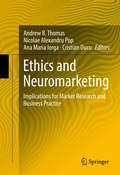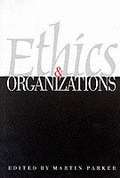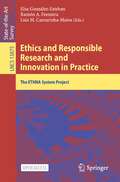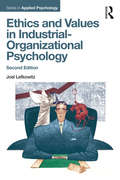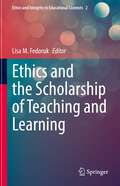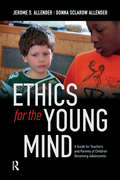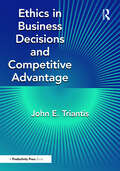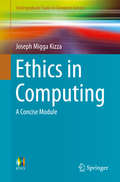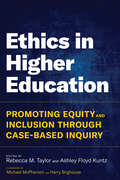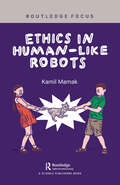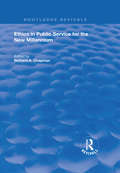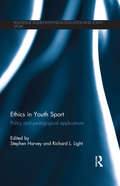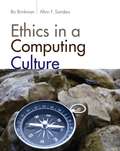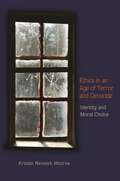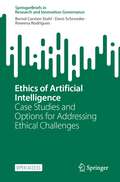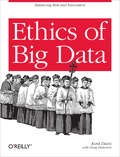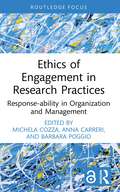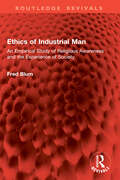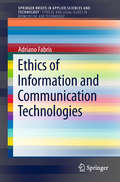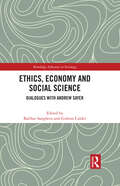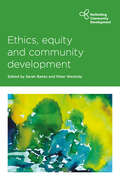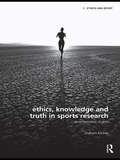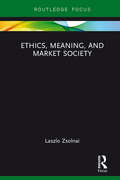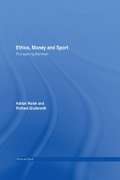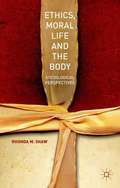- Table View
- List View
Ethics and Neuromarketing
by Andrew R. Thomas Nicolae Alexandru Pop Ana Maria Iorga Cristian DucuThis book addresses the emerging field of neuromarketing, which, at its core, aims to better understand the impact of marketing stimuli by observing and interpreting human emotions. It includes contributions from leading researchers and practitioners, venturing beyond the tactics and strategies of neuromarketing to consider the ethical implications of applying powerful tools for data collection. The rationale behind neuromarketing is that human decision-making is not primarily a conscious process. Instead, there is increasing evidence that the willingness to buy products and services is an emotional process where the brain uses short cuts to accelerate the decision-making process. At the intersection of economics, neuroscience, consumer behavior, and cognitive psychology, neuromarketing focuses on which emotions are relevant in human decision-making, and uses this knowledge to make marketing more effective. The knowledge is applied in product design; enhancing promotions and advertising, pricing, professional services, and store design; and improving the consumer experience as a whole. The foundation for all of this activity is data gathering and analysis. Like many new processes and innovations, much of neuromarketing is operating far ahead of current governmental compliance and regulation and thus current practices are raising ethical issues. For example, facial recognition software, used to monitor and detect a wide range of micro-expressions, has been tested at several airports--under the guise of security and counterterrorism. To what extent is it acceptable to screen the entire population using these powerful and intrusive techniques without getting passengers' consent? Citing numerous examples from the public and private sectors, the editors and contributing authors argue that while the United States has catalyzed technological advancements, European companies and governments are more progressive when it comes to defining ethical parameters and developing policies. This book details many of those efforts, and offers rational, constructive approaches to laying an ethical foundation for neuromarketing efforts.
Ethics and Organizations
by Martin ParkerA compilation of academic articles on the connections between ethics and businesses, as well as other organizations.
Ethics and Responsible Research and Innovation in Practice: The ETHNA System Project (Lecture Notes in Computer Science #13875)
by Luis M. Camarinha-Matos Ramón A. Feenstra Elsa González-EstebanThis Open Access book aims to present practical contributions to the ethics governance framework, the conceptualization and characteristics of ethics tools, as well as the experience gained from their application in different institutions.Its main objective is to provide a practical and useful guide that will help other institutions to start introducing Research Ethics effectively in their organizations. The European initiative ETHNA System has designed an ethics governance framework that can be implemented following specific guidelines and tools that can help different types of institutions to promote and generate responsible research and innovation.The papers included in this book were organized in topical sections as follows: foundations; experiences and lessons learned; ethics tools in practice; and looking into the future: main challenges.
Ethics and Values in Industrial-Organizational Psychology, Second Edition (Applied Psychology Series)
by Joel LefkowitzEthics and Values in Industrial-Organizational Psychology was one of the first books to integrate work from moral philosophy, moral psychology, I-O psychology, and political and social economy, as well as business. It incorporates these perspectives into a "framework for taking moral action" and presents a practical model for ethical decision making. The second edition has added a chapter on Virtue Theory, including its application in I-O, Organizational behavior (OB) and business; expands Moral Psychology to two chapters, with more attention to moral emotions, effects of the "dark side" of personality, and the intuitionist model of moral judgment; expands the sections on social and economic justice; and expands the treatment of the Responsible Conduct of Research with a new chapter on Research Integrity. Examples from I-O research and practice, as well as current business events, are offered throughout. It is ideal for ethics and I-O courses at the graduate level.
Ethics and the Scholarship of Teaching and Learning (Ethics and Integrity in Educational Contexts #2)
by Lisa M. FedorukThis book addresses issues related to ethics and the scholarship of teaching and learning, and pays special attention to ethical concerns and experiences that have arisen from engaging in Scholarship of Teaching and Learning (SoTL) work. The book draws on a range of research projects, theoretical frameworks and narrative experiences to provide multiple perspectives of how meaning is made of research ethics in SoTL, academic community and REB partnerships, experiences of Students as Partners in SoTL, and ethically-minded approaches to teaching, learning and inquiry. Specifically, this edited book includes ethical practices that have become increasingly expansive in an ever-evolving academic environment such as navigating pandemic pedagogy and data ownership due to increased online content. In addition, contributions pertaining to academic community partnerships between REBs and faculty detail realistic narratives and lessons learned about how higher education can become more equitable, diverse and inclusive. Subsequently, decolonial ethics for teaching and learning in higher education, as well as participatory parity, exemplify the need for SoTL practitioners to be responsive to the social and cultural realities of a global context in ways that address social inequities and social responsibility. Relational ethics by way of student perspectives on vulnerability and classroom-based SoTL research underscore the need for students to be taught about their own agency as a means of providing student voice within SoTL work. Lastly, this book celebrates how ethically-minded approaches to teaching, learning and inquiry uncover strategies and pedagogy that encourage concepts such as ethical imagination and systems and design thinking practices.
Ethics for the Young Mind: A Guide for Teachers and Parents of Children Becoming Adolescents
by Jerome S. Allender Donna Sclarow AllenderFirst Published in 2016. Routledge is an imprint of Taylor & Francis, an Informa company.
Ethics in Business Decisions and Competitive Advantage
by John E. TriantisBusiness ethics is the set of practices and policies that companies use to guide them through decisions about finances, negotiations and deals, corporate social responsibility, and more. Without a strong set of ethics, a business can run afoul of the law and encounter financial pitfalls and moral dilemmas. The objective of this book is a practical, fair, balanced, and objective treatment of the role of ethics in the business performance of companies in competitive markets that demonstrates how ethics affects business culture, strategy, decision-making, and value creation, which then determine competitiveness and business viability. The universality of corruption and the prevalence of unethical conduct is the background from which the narrative describes how ethical issues enter all functional areas. The ethics’ effects on the complexity of decisions and challenges are examined and the questions of why bother with ethical business and whether businesses invite government regulation are answered. Next, a framework is developed to identify and trace links and influences of business ethics on strategic decisions, corporate culture, and decision-making. The effects of strategy and culture on key business success factors and their interdependence are reviewed along with those with competitive advantage elements. These assessments then form the basis of characterizing competitive advantage in the framework developed. Decision-making and strategy links with competitive advantage elements and the inter-competitive advantage element interactions are evaluated along with competitive advantage organizational effects. The uniqueness of this book is the creation of a method to identify and assess how ethics impacts business decisions and competitive advantage based on accepted economic tenants. It lays the plan for quantitative assessments of the impact of ethical behavior, and it is written from the perspective of a business economist. Other books deal with business ethics elements only; none explains how ethics’ effects permeate business sustainability. The main contribution of this book is demonstrating that ethics is a necessary factor for business sustainability. It provides insights to regulators at all government levels, counterbalances ethicist claims about business ethics, and points out how ethical business conduct affects the economy.
Ethics in Computing
by Joseph Migga KizzaThistextbook raises thought-provoking questions regarding our rapidly-evolvingcomputing technologies, highlighting the need for a strong ethical framework inour computer science education. Ethicsin Computing offers a concise introduction to this topic, distilled fromthe more expansive Ethical and SocialIssues in the Information Age. Features: introduces the philosophical framework for analyzingcomputer ethics; describes the impact of computer technology on issues ofsecurity, privacy and anonymity; examinesintellectual property rights in the context of computing; discusses suchissues as the digital divide, employee monitoring in the workplace, and healthrisks; reviews the history ofcomputer crimes and the threat of cyberbullying;provides coverage of the ethics of AI, virtualization technologies, virtualreality, and the Internet; considers the social, moral and ethical challengesarising from social networks and mobile communication technologies; includesdiscussion questions and exercises.
Ethics in Higher Education: Promoting Equity and Inclusion Through Case-Based Inquiry
by Rebecca M. Taylor and Ashley Floyd KuntzIn this thought-provoking volume, editors Rebecca M. Taylor and Ashley Floyd Kuntz invite readers to explore the many facets of on-campus ethical dilemmas and the careful, nuanced decision-making processes required to address them.Taylor and Kuntz demonstrate how to apply collaborative, multidisciplinary, philosophical inquiry to deeply complex issues. They present seven normative case studies focusing on a variety of campus quandaries, from urgent matters such as Title IX violations and free speech in social media policy to long-simmering concerns such as admissions and access and the future of historically Black colleges and universities. The editors then bring together a diverse group of scholars and practitioners with a broad array of disciplinary and personal backgrounds to offer their commentary and insight on the cases.Leaders in higher education are under immense pressure to respond to campus crises quickly, to quell controversy, and to avoid the backlash of public scrutiny in an ever-shifting sociopolitical terrain. Yet, in tension with such pressures, adequate responses to these dilemmas require leaders to make ethical, contextual choices that effectively foster inclusion, respect individual and institutional freedoms, and promote equity.Expanding the scope of inquiry, the contributors challenge underlying assumptions, raise points that had been omitted from the original cases, and imagine alternative solutions. Ethics in Higher Education appeals to readers to do the same, in the interest of advancing ethical decision-making on campuses.
Ethics in Human-like Robots
by Kamil MamakThe idea of creating artificial humans can be found at the beginning of the human culture. Ancient myths contain the stories of artificial humans brought to life by gods. The word robot originates from a play that was about artificial humans made from artificial flesh that aims to serve real humans. With advancements in robotics, the materialization of this idea is more real than ever before. We are witnessing attempts to create humanoid robots that might be deployed in many spheres of our life - policing, healthcare, and even for love and sex.The book focuses on the ethical issues of human likeness of robots and human tendency to anthropomorphize. It is built on the assumption that design choices are not neutral, and they need to be discussed to align robots with human values. With robots operating in the physical world, they bring ideas and risks that should be addressed before widespread deployment. The book reviews specific issues and provides suggestions and recommendations for improving robots to serve humans better. It draws on literature from Human-Robot Interactions, ethics of AI and robotics, and the philosophy of technology.
Ethics in Public Service for the New Millennium
by Richard A. ChapmanThis title was first published in 2000: The focus of this analysis is that of moral standards in public service, with special attention to the role(s) of officials. It presents discussion of some of the issues that seem to the contributors to be of pressing importance and that seem to have relevance for public service in the new millennium. It concentrates in particular on public officials, and the constraints imposed on them by the political environment in liberal democracies.
Ethics in Youth Sport: Policy and Pedagogical Applications (Routledge Studies in Physical Education and Youth Sport)
by Stephen Harvey Richard L. LightThe influence of professional, adult sport on youth sport is now a global concern. Children are involved in high-stakes competitive sport at national and international levels at an increasingly young age. In addition, the use of sport as a medium for positive youth development by governments and within the community has fuelled ambitious targets for young people’s participation in sport at all levels. In this important study of ethical issues in and around youth sport, leading international experts argue for the development of strong ethical codes for the conduct of youth sport and for effective policy and pedagogical applications to ensure that the positive benefits of sport are optimized and the negative aspects diminished. At the heart of the discussion are the prevailing standards and expectations of youth sport in developed societies, typically consisting of the development of motor competence, the development of a safe and healthy lifestyle and competitive style, and the development of a positive self-image and good relationship skills. The book examines the recommendations emerging from the ‘Panathlon Declaration’ and the debates that have followed, and covers a wide range of key ethical issues, including: emotional and physical abuse aggression and violence doping and cheating values and norms teaching and coaching integrity management. Ethics in Youth Sport is focused on the application of ethical policy and pedagogies and is grounded in practice. It assumes no prior ethical training on the part of the reader and is essential reading for all students, researchers, policy makers and professionals working with children and young people in sport across school, community and professional settings.
Ethics in a Computing Culture
by Bo Brinkman Alton F. SandersETHICS IN A COMPUTING CULTURE introduces key ideas in moral theory and professionalism to explore the hottest topics in computer ethics. With a unique blend of theory, application, and critical thinking exercises, each chapter underscores the interdisciplinary links between computing and diverse areas of study. Abundant multicultural cases are presented throughout to highlight contrasts and conflicts in ethical perspectives across the globe. ETHICS IN A COMPUTING CULTURE encourages students to continually read, reflect and write to hone sharp critical thinking skills. Students learn that that computing is not a purely technical discipline but one with moral and social implications that affect everyday life.
Ethics in an Age of Terror and Genocide: Identity and Moral Choice
by Kristen Renwick MonroeThe significance of identity and psychology in determining moral choiceWhat causes genocide? Why do some stand by, doing nothing, while others risk their lives to help the persecuted? Ethics in an Age of Terror and Genocide analyzes riveting interviews with bystanders, Nazi supporters, and rescuers of Jews during the Holocaust to lay bare critical psychological forces operating during genocide. Monroe's insightful examination of these moving—and disturbing—interviews underscores the significance of identity for moral choice.Monroe finds that self-image and identity—especially the sense of self in relation to others—determine and delineate our choice options, not just morally but cognitively. She introduces the concept of moral salience to explain how we establish a critical psychological relationship with others, classifying individuals in need as "people just like us" or reducing them to strangers perceived as different, threatening, or even beyond the boundaries of our concern. Monroe explicates the psychological dehumanization that is a prerequisite for genocide and uses her knowledge of human behavior during the Holocaust to develop a broader theory of moral choice, one applicable to other forms of ethnic, religious, racial, and sectarian prejudice, aggression, and violence. Her book fills a long-standing void in ethics and suggests that identity is more fundamental than reasoning in our treatment of others.
Ethics of Artificial Intelligence: Case Studies and Options for Addressing Ethical Challenges (SpringerBriefs in Research and Innovation Governance)
by Doris Schroeder Rowena Rodrigues Bernd Carsten StahlThis open access collection of AI ethics case studies is the first book to present real-life case studies combined with commentaries and strategies for overcoming ethical challenges. Case studies are one of the best ways to learn about ethical dilemmas and to achieve insights into various complexities and stakeholder perspectives. Given the omnipresence of AI ethics in academic, policy and media debates, the book will be suitable for a wide range of audiences, from scholars of different disciplines (e.g. AI science, ethics, politics, philosophy, economics) to policy-makers, lobbying NGOs, teachers and the educated public.
Ethics of Big Data: Balancing Risk and Innovation
by Kord DavisWhat are your organization’s policies for generating and using huge datasets full of personal information? This book examines ethical questions raised by the big data phenomenon, and explains why enterprises need to reconsider business decisions concerning privacy and identity. Authors Kord Davis and Doug Patterson provide methods and techniques to help your business engage in a transparent and productive ethical inquiry into your current data practices.Both individuals and organizations have legitimate interests in understanding how data is handled. Your use of data can directly affect brand quality and revenue—as Target, Apple, Netflix, and dozens of other companies have discovered. With this book, you’ll learn how to align your actions with explicit company values and preserve the trust of customers, partners, and stakeholders.Review your data-handling practices and examine whether they reflect core organizational valuesExpress coherent and consistent positions on your organization’s use of big dataDefine tactical plans to close gaps between values and practices—and discover how to maintain alignment as conditions change over timeMaintain a balance between the benefits of innovation and the risks of unintended consequences
Ethics of Engagement in Research Practices: Response-ability in Organization and Management (Routledge Focus on Women Writers in Organization Studies)
by Michela Cozza Anna Carreri Poggio BarbaraThis book elaborates on the concept of response-ability. Although the notion is becoming popular in organization and management studies to talk about the ethical dimension of academic practices and research work, it has been formulated outside this discipline with Joan Tronto, Donna Haraway, Vinciane Despret, and Karen Barad as key authors. This book honors the foundational contribution of these scholars and their legacy.This book adopts a feminist posthumanist definition of response-ability as an iterative and emergent process that unfolds within embodied relations and through academic practices. A response-able academic practice intertwines personal reflexivity and critical analysis of the politics underlying our ways of knowing and doing in academia. Furthermore, a response-able approach requires us, as researchers, to pay attention to the consequences of our research practices through which multiple encounters are made possible (or impossible).By offering empirical examples and theoretical elaborations, this book invites students, researchers, and practitioners to find ways of embodying response-ability when generating knowledge.
Ethics of Industrial Man: An Empirical Study of Religious Awareness and the Experience of Society (Routledge Revivals)
by Fred BlumHow do people actually experience God, Jesus Christ, the Kingdom and the Church? Does this experience affect their awareness of capitalism, socialism, competition, the relationship of markets to men, and their participation in politics? Does modern man have an ethical concern?First published in 1970, Ethics of Industrial Man explores the interrelationship between people’s experience of a deeper reality of life, their awareness of society and their participation in it. It is usually assumed that religion has lost its impact on the daily life of man. This is true, inasmuch as most people live their working lives divorced from religiously grounded ethics. But the author shows that it ceases to be true if we explore the significance of the universal ground in which all religious awareness and every social order is rooted. Using intensive interviews in Great Britain and the United States over a number of years, the author gives empirical evidence that the ethical impulse is not absent but is thwarted by the absence of bridges between the socio-economic sphere of life and people’s ethical awareness. Decisive in this connection is the confusion between what is universal and what is historically specific. This confusion, the author believes, underlies the apathy, the sense of powerlessness, the prevalence of a false consciousness, the decline of traditional religious forms. It is, he concludes, the core of the ethical corrosion of our time.
Ethics of Information and Communication Technologies (SpringerBriefs in Applied Sciences and Technology)
by Adriano FabrisThis book discusses key ethical and deontological problems concerning the use of the most common information and communication devices. It focuses on the challenges of the new environments we now find ourselves in thanks to these technologies, and the issues arising from the newly established relationship between the virtual sphere and the real world. Each aspect is analysed by starting from a very specific example or a case study presenting a dilemma that can only be resolved by making a reasoned ethical choice. Rather than thematically addressing only one of the many aspects mentioned above (for example, computer ethics or social network ethics), the book presents a comprehensive introduction to, and a co-ordinated overview of, the various deontological and ethical issues regarding the spread of the most common information and communication technologies.
Ethics, Economy and Social Science: Dialogues with Andrew Sayer (Routledge Advances in Sociology)
by Balihar SangheraThis book is a collection of critical engagements with Andrew Sayer, one of the foremost postdisciplinary thinkers of our times, with responses from Sayer himself. Sayer’s ground-breaking contributions to the fields of geography, political economy and social theory have reshaped the terms of engagement with issues and debates running from the methodology of social science through to the environment, and industrial development to the ethical dimensions of everyday life. Transatlantic scholars across a wide range of fields explore his work across four main areas: critical realism; moral economy; political economy; and relations between social theory, normativity and class. This is the first full-length critical assessment of Sayer’s work. It will be of interest to readers in sociology, economics, political economy, social and political philosophy, ethics, social policy, geography and urban studies, from upper-undergraduate levels upwards.
Ethics, Equity and Community Development (Rethinking Community Development)
by Sarah Banks and Peter WestobyThis book offers a unique focus on the everyday ethics of community development practice in the context of local and global struggles for equity and social justice. Contributors from around the world (from India to the Netherlands and USA) grapple with ethical dilemmas and tensions, including how to: respect and learn from Indigenous values and philosophies; challenge environmental destruction; gain consent in divided communities; maintain or breach professional boundaries; and develop new paradigms for transformative community organising, sustainable development and ethically-sensitive practice. Offering theoretical frameworks, philosophical perspectives and practical case examples (from sex worker collectives to tree action groups and Australian Indigenous communities) this book is essential reading for community-based practitioners, students and academics.
Ethics, Knowledge and Truth in Sports Research: An Epistemology of Sport (Ethics and Sport)
by Graham McFeeThe study of sport is characterised by its inter-disciplinarity, with researchers drawing on apparently incompatible research traditions and ethical benchmarks in the natural sciences and the social sciences, depending on their area of specialisation. In this groundbreaking study, Graham McFee argues that sound high-level research into sport requires a sound rationale for one’s methodological choices, and that such a rationale requires an understanding of the connection between the practicalities of researching sport and the philosophical assumptions which underpin them. By examining touchstone principles in research methodology, such as the contested ‘gold standard’ of voluntary informed consent in the natural sciences and the postmodern denial of ‘truth’ in the social sciences, McFee demonstrates that epistemology and ethics are inextricably linked. Drawing on a wide range of examples, from the laboratory to the sports field, McFee explores the concepts of ‘knowledge’ and ‘truth’ in sports research and makes a powerful case for a philosophical deepening of our approach to method and methodology in sport. This book is important reading for all advanced students and researchers working in sport, exercise and related disciplines.
Ethics, Meaning, and Market Society (Routledge Focus on Business and Management)
by Laszlo ZsolnaiThis book explores the underlying causes of the pervasive dominance of ‘unethics’ in contemporary affairs in economics, business, and society. It is argued that the state of unethics is related to the overexpansion of market and market values in all spheres of social life and human activities. A correlate of this development is the emergence of an extremely individualistic, materialistic and narcissistic mind-set that dictates the decisions and behavior of people and organizations. The author argues that art can help to overcome the dominant market metaphysics of our age, as genuine art creates models of 'poetic dwelling,' which can generate non-linear, progressive change that opens up a larger playing field for ethics. Aesthetics and ethics go hand in hand. Ethical action is not just right for its own sake, but makes the world a richer, livable and more beautiful place. Ethics, Meaning, and Market Society will be of interest to students at an advanced level, academics, researchers and professionals. It addresses the topics with regard to ethics in economics, business, and society in a contemporary context.
Ethics, Money and Sport: This Sporting Mammon (Ethics and Sport)
by Richard Giulianotti Adrian WalshWritten from the contrasting yet complementary perspectives of sociology and philosophy, this book explores the far-reaching ethical consequences of the runaway commodification of sport, focusing on those instances where commodification gives rise to morally undesirable consequences. The authors consider three main areas of concern for participators and observers alike: the corrosion of the core meanings and values of sport, the increasing elitism of access to sporting commodities, and the undermining of social conditions that support sporting communities. Unique in its focus on the ethical dimension of the powerful economics of today’s sport, this book will be of interest, not only to those in the fields of sports studies and ethics of sport, but also to academics, researchers and students in philosophy of morality, sociology, and the ethics of globalization as viewed through the ultimate globalized phenomenon of modern sport.
Ethics, Moral Life and the Body: Sociological Perspectives
by Rhonda ShawShaw addresses the 'ethical turn' in contemporary sociological thinking, by exploring the contribution of sociology and the social sciences to bioethical debates about morality and tissue exchange practices.
